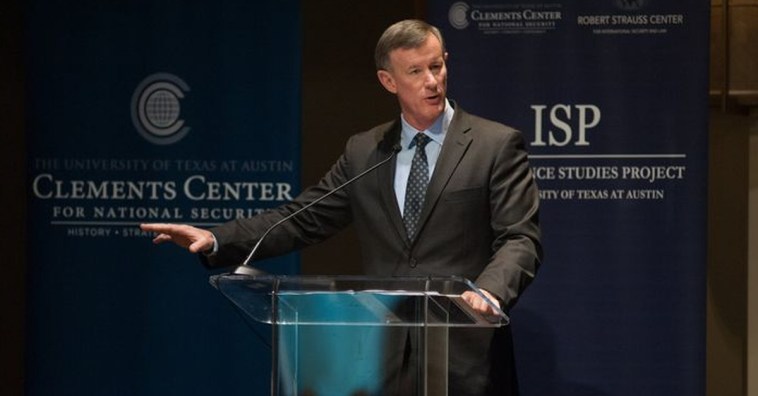Calling terrorists lawless barbarians, University of Texas System Chancellor Bill McRaven on Friday called on the U.S. and its allies to prioritize defeating the Islamic State group.
Videos By Rare
He said the biggest struggle is a domestic one: convincing the American people that the money and casualties spent on the battle are worth it.
“In the end, we know the right strategy: It is continuous and direct action on the extremists until they have no more capacity and no more reach. It will be a generational fight, but if we don’t take it on now, then we should not be surprised when the barbarians are at our gate and we’re wondering how they got here,” McRaven said.
McRaven’s lunch address at UT’s second annual national security conference included some of the strongest language he’s used since becoming chancellor in January. His animated delivery came a week after 130 people in Paris were killed in multiple attacks for which the Islamic State has claimed responsibility.
“They have invited young men and some women in so that they can act out their greatest perversion. It’s not about an ideology. It’s not about the caliphate,” he said. “I believe that they bring people in because they realize they can kill, they can rape with impunity, they can torture, they can do these barbaric things in the name of Islam.”
It’s no coincidence that McRaven takes opportunities such as the security forum – as well as recent TV interviews with Anderson Cooper and Charlie Rose – to inject his name and the UT brand into the nation’s discussion of the evolving terrorist threat. The chancellor announced plans recently to establish the UT Network for National Security, an alliance across the system’s 14 campuses that would knit together experts in cyber, border, biomedical, petroleum and other security facets.
McRaven — the former commander of U.S. Special Operations Command best known for directing the raid in which al-Qaida leader Osama bin Laden was killed — said that since the 9/11 attacks, the U.S. and its allies have amassed the resources and intelligence to defeat terrorist groups. He said sophisticated and adaptable military equipment, a robust network of intelligence and law enforcement officials, and continuous action with “boots on the ground” will help defeat the Islamic State group.
McRaven’s stance wasn’t well received by all in the audience Friday. Before he took the stage, a group of students shot up from a table, calling him a mass murderer who perpetuated Islamophobia during his military career.
Another audience member questioned whether McRaven should be publicly supporting war given that he is the leader of a public university system. McRaven responded that he could exercise his right to free speech even as a chancellor, which garnered loud applause from the audience.
A panel of foreign policy and military experts in a standalone forum on the Middle East earlier Friday agreed that heavy U.S. involvement is needed to address the region’s unrest. The Islamic State has taken advantage of the civil war in Syria to make that country its safe haven, the experts said. Several suggested the U.S. could broker a deal with Russia to help tamp down on the conflict between Syrian ruler Bashar al-Assad’s regime and those who oppose him and instead help Syria fight Islamic State militants.
Philip Mudd, former deputy director of the CIA Counterterrorism Center, told the audience at Friday’s forum he expects a deal between Russia and the U.S. within the next 120 days.
Other experts, including McRaven, warn against expecting too much help from Russian President Vladimir Putin, who has a strong disdain for Western influence and whose government has backed Assad.
“Yes, Vladimir Putin probably worries about terrorism and Russians going to Syria and back,” said Michael Singh, managing director at The Washington Institute for Near East Policy. “But I think he also worries about … revolutions and leaders being toppled by Western coalition, and I don’t think he will agree to see Assad off.”
Singh also told reporters that while the U.S. tries to broker some diplomatic deal around Syria, America — with a good vetting process in place — should strongly consider allowing Syrian refugees into the country.
“The United States has a tradition of accepting refugees, which we should be proud of. We do this because it accords with our values,” he said.
The conference continues Saturday with a panel on terrorism and closing remarks by U.S. Sen. John Cornyn, R-Texas.

